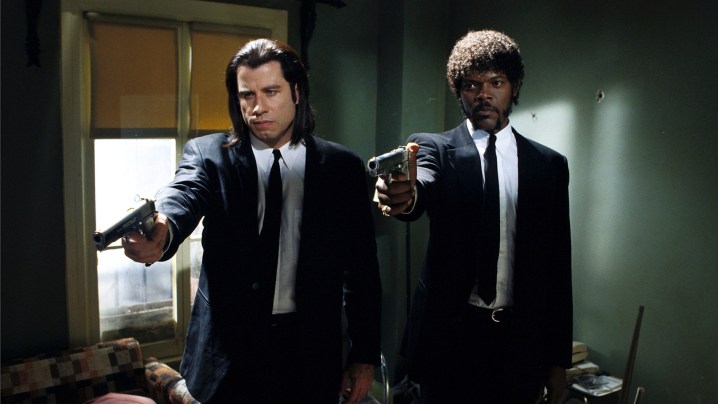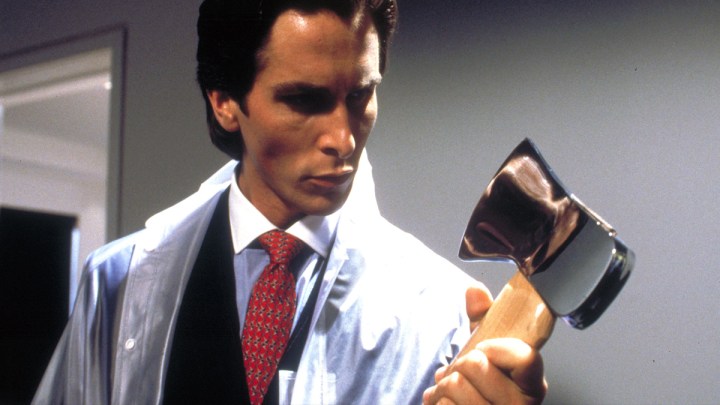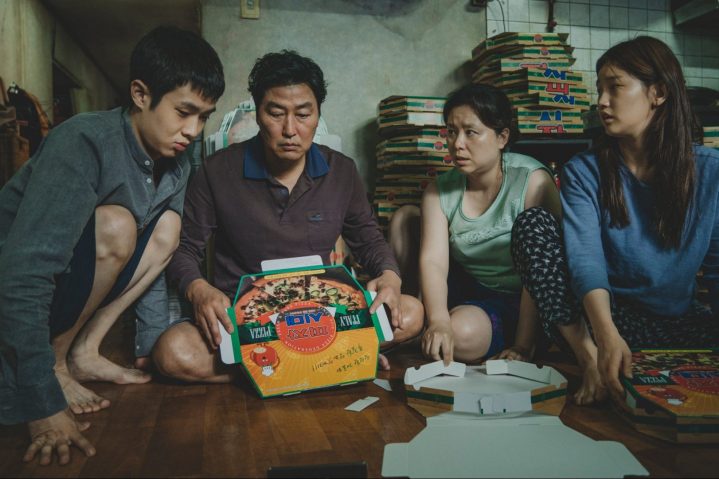Dark comedy is where humor meets absurdity, with the best films in the genre delivering laughs from unexpected and even unsettling places. The genre thrives on contrast, often juxtaposing the bleakest realities of life with laugh-out-loud comedy, expertly walking the tightrope between funny and horrifying. These films often expose humanity and society’s flaws, making audiences laugh while leaving them plenty to think about.
The best dark comedy movies are the perfect blend of disturbingly grim and outrageously hilarious, from the satirical modern classic Parasite to the ’90s crime favorite Fargo. These flicks will have fans guffawing one minute and questioning their own sense of humor the next, providing wholly entertaining and unique viewing experiences that cinephiles will enjoy.
We also have guides to the best movies on Netflix, the best movies on Hulu, the best movies on Amazon Prime Video, the best movies on Max, and the best movies on Disney+.
10. Get Out (2017)
 Universal Pictures
Universal PicturesIn Jordan Peele’s stellar directorial debut, a young Black man finds himself in a nightmarish situation when his first time meeting his white girlfriend’s parents goes horrifically wrong. Get Out follows Chris Washington’s (Daniel Kaluuya) terrifying experiences when he learns that Rose Armitage’s (Allison Williams) family is hiding a cult-like conspiracy that involves hypnotism and a disturbing form of body-swapping. The Armitages are definitely not the open-minded and welcoming family they presented themselves as, with their sinister secret soon revealed during the surreal weekend.
Get Out is a social horror movie that embraces dark humor to deliver biting satire on racism. Full of uncomfortable scenes like awkward interactions between Chris and Rose’s family, there are several layers to unpack even before the twisted premise is fully revealed. With the 2017 award-winning film, Peele has established himself as a talented auteur in a genre that has often been used to explore deeper societal issues.
9. Harold and Maude (1971)
 Paramount Pictures
Paramount PicturesHarold and Maude is a deliciously dark cult classic that follows 20-year-old Harold Chasen (Bud Cort), a wealthy young man obsessed with death, who spends his days attending strangers’ funerals and staging elaborate fake suicides. Harold’s life takes an unexpected turn when he meets Maude (Ruth Gordon), a 79-year-old woman who embraces life with uninhibited joy. She tries to show Harold the value of life and shares her love for the weird and unconventional. Their friendship soon blossoms into an unusual romance, and Harold learns to see the beauty in life through Maude’s carefree spirit.
Director Hal Ashby’s 1971 film was initially critically panned, with many appalled by its oddball relationship and macabre subjects like death and suicide. It has since been re-evaluated as one of the greatest movies of the ’70s, however, thanks to its charming use of black comedy to deliver surprisingly sharp insights on existentialism and what makes life worth living. Harold and Maude‘s offbeat humor and romance that challenges societal norms were way ahead of their time, making it a timeless movie to revisit today.
8. In Bruges (2008)
 Universal Pictures
Universal PicturesBefore Colin Farrell and Brendan Gleeson starred in the Oscar-award-winning The Banshees of Inisherin, they worked together on another dark comedy directed by Martin McDonagh, 2008’s In Bruges. The film is centered on hit men Ray (Farrell) and Ken (Gleeson), who are sent to the picturesque Belgian town of Bruges after a botched job in London. Ray, haunted by guilt over accidentally killing a child during his first assignment, despises Bruges and struggles during the entire time he’s there. Ken, the older and more seasoned hit man, actually enjoys the old medieval town, at least until he receives further instructions from their boss, Harry (Ralph Fiennes).
In Bruges soars thanks to the incredible chemistry between the two leads, with Farrell and Gleeson perfectly capturing their opposing characters and the unique bond they have despite their differences. McDonagh’s script is witty, with bleak comedy often rooted in Ray’s inability to accept his own recent mistake. With a clever twist bordering on the absurd, the 2008 British comedy movie promises a one-of-a-kind viewing experience for fans of the genre.
7. Heathers (1988)
 New World Pictures
New World PicturesDirector Michael Lehmann’s Heathers is a genre classic that takes aim at high school life through a darkly comedic story that follows Veronica Sawyer (Winona Ryder). Initially part of a ruthless clique known as the Heathers in Westerburg High, Veronica grows tired of her role in the toxic group made up of three girls all named Heather. She finds an ally when a rebellious new student, J.D. (Christian Slater), has ideas to end the reign of the popular crowd. Veronica questions her decision when their plan to “eliminate” the popular kids, disguising their deaths as suicides, spirals out of control.
Heathers is hailed as one of the best dark comedies ever thanks to its scathing and unapologetic depiction of the casual cruelty so many experience in high school, especially at the time the film was released. The 1988 film uses humor to deftly touch on more serious topics like bullying and suicide, with Ryder and Slater’s off-the-charts chemistry and wickedly fun performances cementing Heathers as a teen movie for the ages.
6. A Clockwork Orange (1971)
 Warner Bros.
Warner Bros.Set in a near-future society, A Clockwork Orange is a darkly comedic dystopian film that follows Alex DeLarge (Malcolm McDowell), a psychopathic delinquent who leads a gang of “droogs” in committing heinous acts of “ultraviolence.” Alex’s nights of fun and violence abruptly end when he is arrested and subjected to a controversial government experiment aimed at “curing” his violent tendencies through aversion therapy. Stripped of his ability to choose between good and evil, Alex finds himself unable to return to his past self and is instead reduced to a pawn within a larger battle over free will.
Among director Stanley Kubrick’s best movies, A Clockwork Orange is a brilliant adaptation of Anthony Burgess’ eponymous 1962 novel, with the filmmaker using an unsettling and bold approach to produce a satirical masterpiece. The 1971 film uses its bizarre humor to capture the absurdity of a society obsessed with control and the suppression of individuality. Through Alex’s arc, it asks what true evil looks like in a world where unchecked state power can take away humanity, becoming a landmark cinematic masterpiece in the process.
5. Pulp Fiction (1994)
 Miramax Films
Miramax FilmsThe masterpiece that turned director Quentin Tarantino into a household name, Pulp Fiction is a one-of-a-kind film that stood out for its unconventional narrative. Its non-linear storyline revolves around a colorful cast of characters, including hit men Vincent Vega (John Travolta) and Jules Winnfield (Samuel L. Jackson) and their mobster boss’ wife, Mia Wallace (Uma Thurman). In another part of town, a pair of small-time robbers, Pumpkin (Tim Roth) and Honey Bunny (Amanda Plummer) contemplate their next move. Bruce Willis also makes an appearance as the boxer Butch Coolidge.
Divided into seemingly unrelated segments that eventually converge, Pulp Fiction tells its crime-thriller narrative with a healthy dose of dark comedy. Its sharp dialogue and unexpected reveals are all delivered with comedy that embraces absurdity, often mixing casual conversations with sudden bursts of violence. The 1994 movie’s twisted sense of humor would prove to be incredibly influential, ensuring Tarantino’s spot among the most outstanding talents of his generation.
4. American Psycho (2000)
 Lionsgate Films
Lionsgate FilmsAmerican Psycho is a dark comedy, satirical horror, and psychological thriller film all in one. Directed by Mary Harron and set in 1980s Manhattan, it follows the wealthy investment banker Patrick Bateman (Christian Bale), who is the epitome of the yuppie lifestyle by day, with the character focused on appearances, designer brands, and a meticulously crafted persona. This all transforms by night, when his psychopathic tendencies surface and he commits gruesome acts of violence against colleagues, women, and anyone who crosses his path. However, as the film progresses, it becomes unclear whether Bateman’s brutal actions are delusions or not.
With its razor-sharp satire of consumer culture and brilliant use of humor to critique the excesses of wealth and vanity, American Psycho deserves its reputation as a widely celebrated classic. Its wickedly funny social commentary is delivered through both the mundane — such as Bateman’s obsessively detailed skincare routine — and the disturbing — like every bloody murder in his apartment. The 2000 movie successfully exposes the superficiality of the yuppie lifestyle and the dehumanizing effects of capitalism while offering a wildly entertaining viewing experience.
3. Fargo (1996)
 Working Title Films
Working Title Films“Oh, geez…” Director Joel and Ethan Coen‘s Fargo is a crime comedy film that takes place in Minnesota and North Dakota, where Jerry Lundegaard (William H. Macy), a struggling car salesman, plans to have his wife kidnapped so he can extort ransom money from his rich father-in-law. This plan quickly spirals out of control, however, with the criminals he hires leaving dead bodies behind. The investigation into these crimes is led by Marge Gunderson (Frances McDormand), a pregnant and unflappably cheerful police chief, who slowly pieces together the bizarre puzzle.
Full of Midwestern charm and unexpected dark humor, Fargo relies on the bizarre juxtaposition between the brutality of the crimes it depicts and the Coen brothers’ signature wit. The film is full of deadpan interactions and moments that capture the quirks of Midwestern life. It also undoubtedly soars thanks to an Oscar-award-winning performance from McDormand, whose earnestness and warmth make it impossible not to root for her success.
2. Parasite (2019)
 CJ Entertainment
CJ EntertainmentA film that needs no introduction and certainly the best among the recent string of eat-the-rich movies, Parasite became an international phenomenon when it first premiered. Directed by Bong Joon-ho, it has a deceptively simple premise that’s centered on the underprivileged Kim family, who infiltrate the wealthy Park family’s household by posing as skilled workers. As they enjoy their new jobs and time spent in the Kims’ huge house, the story takes an sudden genre-bending turn that leads to some startling consequences in the final act.
Often hailed as a modern masterpiece, Parasite is a grim portrayal of the violence of class disparity and the universal reality that is inequality. It not only entertains with its incisive satire, but shocks with an iconic twist that forces audiences to confront uncomfortable truths about privilege. The 2019 movie would become a global hit and make history as the first non-English-language film to win the Academy Award for Best Picture, among other well-deserved prestigious accolades that reflect its status as a legendary work from South Korea.
1. Dr. Strangelove (1964)
 Columbia Pictures
Columbia PicturesDr. Strangelove or: How I Learned to Stop Worrying and Love the Bomb is a quintessential dark comedy that satirizes the Cold War-era paranoia and the terrifying prospect of nuclear annihilation. Directed by Stanley Kubrick, the film portrays a catastrophic series of events set in motion by a deranged U.S. Air Force general, Jack D. Ripper (Sterling Hayden), who orders a nuclear attack on the Soviet Union where he believes a communist plot is brewing. As the U.S. government scrambles to recall the bombers, President Merkin Muffley (Peter Sellers) and his advisers, including the ex-Nazi scientist Dr. Strangelove (also Sellers), gather in the War Room to prevent a global catastrophe.
An acerbic satire that’s still painfully relevant six decades later, Dr. Strangelove showcases the very real fears people had about their safety and society’s fragility in the face of devastating weapons. It forces viewers to laugh at Cold War logic, where the fate of the world hinges on the irrational decisions of a few powerful men. Sellers expertly portrays this absurdity in his career-defining performance that sees him play three characters that have become synonymous with the genre.




















 English (US) ·
English (US) ·